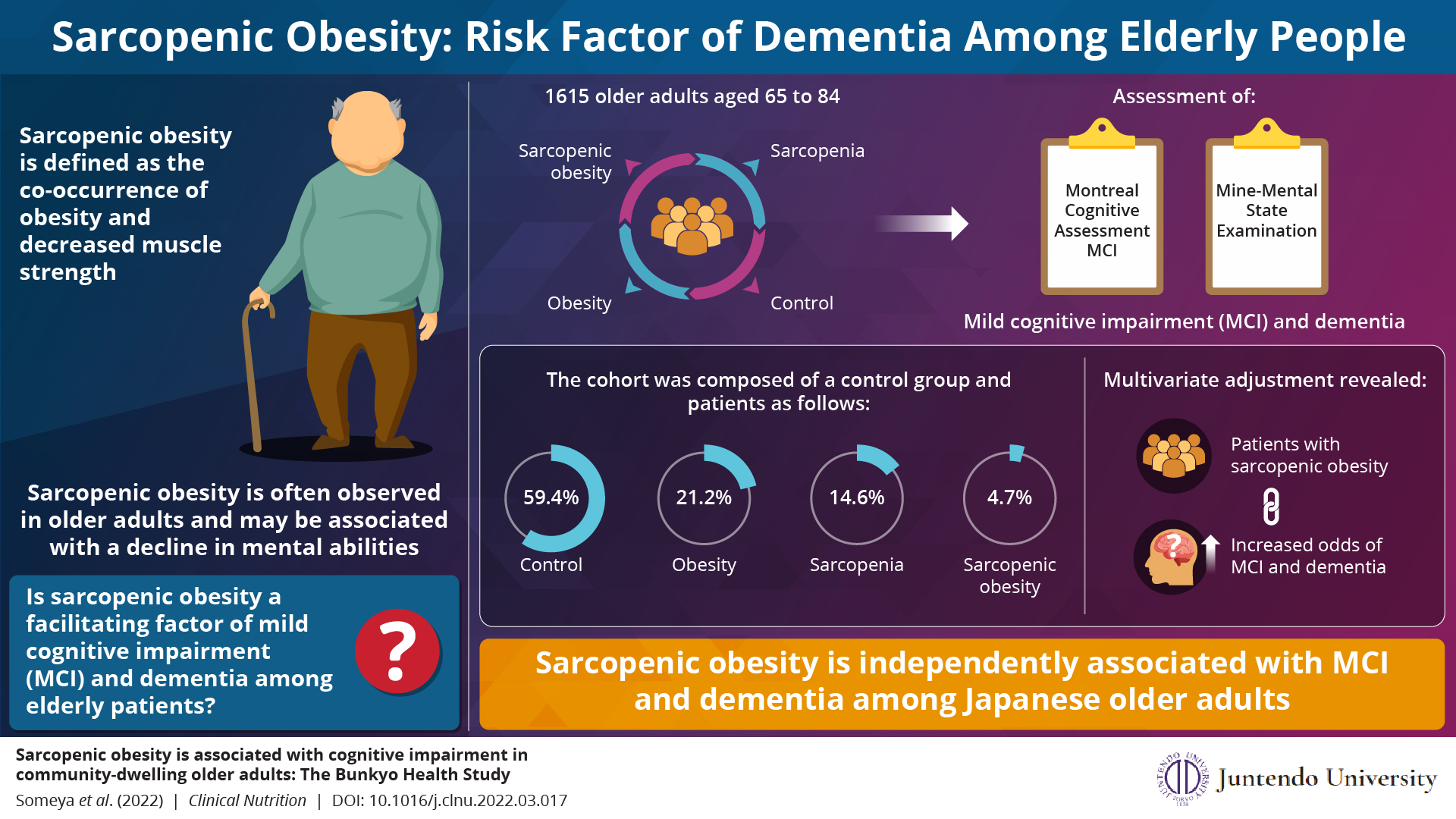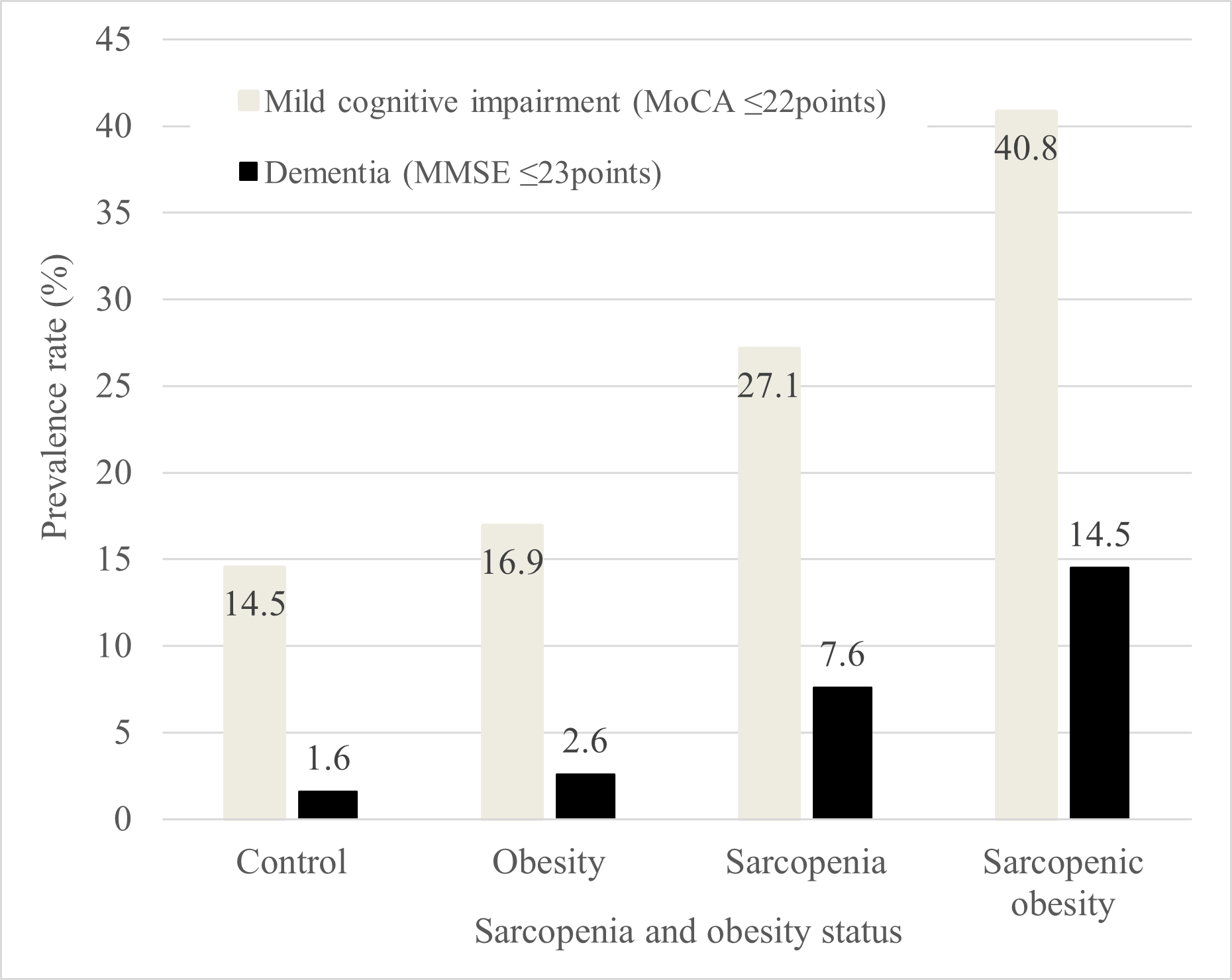May. 25, Wed, 2022
Topics
>RESEARCH
Sarcopenic Obesity Linked to Dementia in Elderly Patients, Say Scientists
Scientists link dementia in elderly people with an unlikely candidate: sarcopenic obesity.

Dementia is a major health condition that affects over 15% Japanese people aged over 65 years. There are many reasons for the onset of dementia, among which sarcopenic obesity is considered a higher risk factor for various cognitive impairments. Does
this association exist with dementia too? In this new study, a group of researchers from Japan addresses this question. They establish the association between sarcopenic obesity and dementia, opening up new possibilities in dementia treatment.
Obesity, an increasingly prevalent lifestyle disease, often occurs along with poor muscle mass. This condition, called sarcopenic obesity, is evaluated based on the patients’ body mass index (BMI) and handgrip strength. Interestingly, sarcopenic obesity is known to increase the risk of cognitive impairment. Dementia, a cognitive condition where memory, thinking and social abilities progressively decline, is known to significantly affect the quality of life in elderly people. Is this condition associated with sarcopenic obesity?
In a new study published in Clinical Nutrition, a group of researchers led by Dr. Yoshifumi Tamura of Juntendo University, Japan, explored this very question. “If the association between sarcopenic obesity and dementia is established, appropriate preventive measures can be taken to reduce the occurrence of this condition and the risk of dementia in elderly patients,” says Dr. Tamura, stressing on the importance of their study. This study was made available online on March 16, 2022 and was published in Volume 41 Issue 5 of the journal on May 01, 2022.
In the study, the researchers recruited 1615 older Japanese adults aged 65 to 84 years participating in the Bunkyo Health Study. The researchers divided the subjects into four groups based on their sarcopenia and obesity status: those with obesity, those with sarcopenia, those with sarcopenic obesity, and those without obesity or sarcopenia (control). They studied the link between various mental processes, sarcopenia, and obesity status. Sarcopenia or poor muscle strength was determined based on a handgrip strength of less than 28 kg in men and 18 kg in women, while obesity status was given to patients with a BMI greater than 25 kg/m2. Two assessment methods were performed to establish the presence of mild cognitive impairment (MCI) and dementia. A score of less than 22 points on the Montreal cognitive assessment and less than 23 points on the Mine-Mental State Examination were used to confirm MCI and dementia respectively.
They found that 59.4% of the population had neither obesity nor sarcopenia, 21.2% had obesity, 14.6% had sarcopenia, and 4.7% of the population had sarcopenic obesity. The participants with sarcopenic obesity had the greatest rate of MCI and dementia, followed by those with sarcopenia, obesity, and finally the control group. When the team ran multivariate analyses to check for statistically relevant associations, they found that sarcopenic obesity was independently associated with an increased prevalence of MCI and dementia compared with the absence of sarcopenia and obesity. The study also showed that sarcopenia is significantly associated with dementia in women, but not in men.
“This study clearly demonstrates that sarcopenic obesity, defined by the combination of BMI and hand grip strength is associated with MCI and dementia among Japan’s elderly people,” says Dr. Tamura.
But what are the long-term implications of this study?
Dr. Tamura’s answer to this question is encouraging. “Since we now know that there is a strong correlation between sarcopenic obesity and dementia, we may develop new treatment methods to manage the condition, thereby even reducing the prevalence of dementia.”
Reference
| Authors | Yuki Someyaa, Yoshifumi Tamuraa, b, Hideyoshi Kagab, Daisuke Sugimotob, Satoshi Kadowakib, Ruriko Suzukib, Shigeki Aokia, c, Nobutaka Hattoria, d, Yumiko Motoia, e, Kazunori Shimadaa, f, Hiroyuki Daidaa, f, Muneaki Ishijimaa, g, Kazuo Kanekoa, g, Shuko Nojirih, Ryuzo Kawamoria, b, Hirotaka Watadaa, b1,11 |
| Title of original paper | Sarcopenic obesity is associated with cognitive impairment in community-dwelling older adults: The Bunkyo Health Study |
| Journal | Clinical Nutrition |
| DOI | 10.1016/j.clnu.2022.03.017 |
| Affiliations | aSportology Center, Juntendo University Graduate School of Medicine, Tokyo, Japan bDepartment of Metabolism & Endocrinology, Juntendo University Graduate School of Medicine, Tokyo, Japan cDepartment of Radiology, Juntendo University Graduate School of Medicine, Tokyo, Japan dDepartment of Neurology, Juntendo University Graduate School of Medicine, Tokyo, Japan eDepartment of Diagnosis Prevention and Treatment of Dementia, Juntendo University Graduate School of Medicine, Tokyo, Japan fDepartment of Cardiovascular Medicine, Juntendo University Graduate School of Medicine, Tokyo, Japan gDepartment of Medicine for Orthopaedics and Motor Organ, Juntendo University Graduate School of Medicine, Tokyo, Japan hMedical Technology Innovation Center, Juntendo University, Tokyo, Japan |
| Latest Article Publication Date | May 01, 2022 |
| Method of Research | Experimental study |
| Subject of Research | People |
| Conflict Of Interest Statement | None |

Prevalence of cognitive impairment by sarcopenia and obesity status
In a brand-new study, researchers from Japan have shown how co-morbidity with sarcopenia and obesity is linked with cognitive impairment in elderly Japanese people.
Image courtesy: Yoshifumi Tamura from Juntendo University
In a brand-new study, researchers from Japan have shown how co-morbidity with sarcopenia and obesity is linked with cognitive impairment in elderly Japanese people.
Image courtesy: Yoshifumi Tamura from Juntendo University
About Dr. Yoshifumi Tamura
Yoshifumi Tamura is an Associate Professor at the Department of Metabolism & Endocrinology, Juntendo University Graduate School of Medicine in Tokyo, Japan. Also affiliated to the university’s Sportology Center, he also served as the former councilor
of Japan Sports Agency. Prof Tamura’s research topics include insulin resistance, clinical diabetology, exercise therapy, and sarcopenia. He has published over 83 papers and articles.